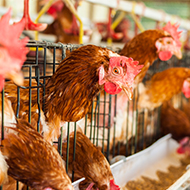Livestock antibiotic sales at lowest level to date
The report marks 10 years of data on AMR in pigs and poultry.
The latest statistics for antibiotic usage have revealed the amount of antibiotics sold for use on livestock to be at its lowest level since reporting began.
Published by the Veterinary Medicines Directorate (VMD) to coincide with World Antimicrobial Resistance Awareness Week, the data uncovered progress in the livestock sector, but warned of future trends.
The UK-Veterinary Antimicrobial Resistance and Sales Surveillance (VARSS) Report found that antibiotic sales for food-producing animals had remained at a steady 59 per cent reduction since records began in 2014. Antibiotics considered of critical importance to human health were at extremely low levels, consisting of just half a per cent of total sales.
This progress in reducing antibiotic use in farming sectors has also led to progress in reducing drug resistance, with AMR in pigs and poultry at an all-time low.
However, the report also identified increases in antibiotic use in some sectors. Researchers warn that, without continued antibiotic stewardship efforts, these trends could lead to AMR increasing again.
This report marks 10 years of the VMD collecting data on pigs and poultry in the harmonised monitoring programme.
It is the first time the report has included information about AMR in sheep and cattle. The VMD hopes that this baseline data will help form a better understanding of AMR in livestock.
It also begins to address a key commitment in the UK’s National Action Plan on AMR by tackling data gaps in antibiotic use and resistance.
The VMD says that monitoring antibiotic use is vital to tackling AMR, which threatens human and animal health, food security and economic growth. It references estimates that more than 39 million deaths between now and 2050 will be linked to bacterial AMR.
It hopes that the data from the report will encourage more in the farming sector to build upon progress.
Abi Seager, VMD CEO, said: “The VMD has been publishing antibiotic sales, use and resistance data for the UK’s animal population for over a decade and the positive trends demonstrate the dedication of the UK’s farmers and vets to ensure responsible antibiotic use in animals.
“I am especially proud of our AMR surveillance programme which continues to expand and become more robust.
“This year also marks the launch of the 2024-2029 AMR National Action Plan, and I look forward to seeing renewed ambition from the veterinary and agriculture sectors as they set new targets through RUMA’s Targets Task Force next year.”
The full report can be found here.
Image © Shutterstock



 An Avian Influenza Prevention Zone (AIPZ) has been introduced across Wales.
An Avian Influenza Prevention Zone (AIPZ) has been introduced across Wales.